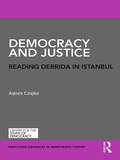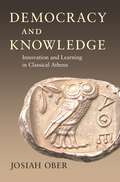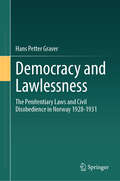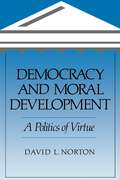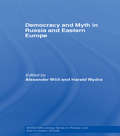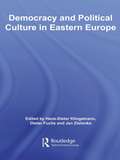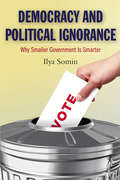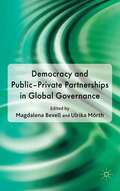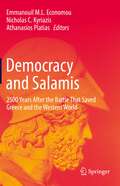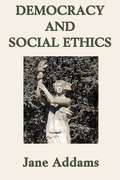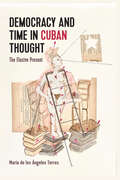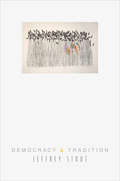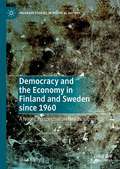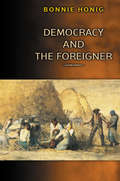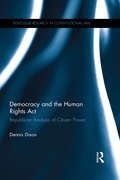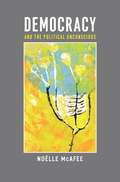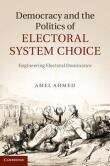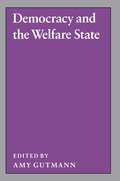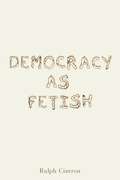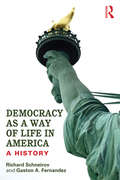- Table View
- List View
Democracy and Justice: Reading Derrida in Istanbul (Routledge Advances in Democratic Theory)
by Agnes CzajkaThis book explores the possibilities offered by Derrida’s work on democracy for interpreting contemporary struggles over democracy in Turkey. The relationship between democracy and justice seems of unquestionable importance to Derrida, with democracy and justice held in tension by deconstruction. Agnes Czajka offers a qualified endorsement of a ‘just democracy’, grounded in the possibilities opened up by reading Derrida’s work on democracy together with his work on justice. She posits that one way of imagining democracy-to-come might be to imagine it as a ‘just democracy’, or one poised at the intersection of the aporia of democracy and the (non)imperative to justice. In the particular context of contemporary struggles over democracy in Turkey, she also explores what such comportment toward a just democracy (or a justice of/in democracy) might look like in the context of that ‘particular’ democracy.
Democracy and Knowledge: Innovation and Learning in Classical Athens
by Josiah OberWhen does democracy work well, and why? Is democracy the best form of government? These questions are of supreme importance today as the United States seeks to promote its democratic values abroad. Democracy and Knowledge is the first book to look to ancient Athens to explain how and why directly democratic government by the people produces wealth, power, and security. Combining a history of Athens with contemporary theories of collective action and rational choice developed by economists and political scientists, Josiah Ober examines Athenian democracy's unique contribution to the ancient Greek city-state's remarkable success, and demonstrates the valuable lessons Athenian political practices hold for us today. He argues that the key to Athens's success lay in how the city-state managed and organized the aggregation and distribution of knowledge among its citizens. Ober explores the institutional contexts of democratic knowledge management, including the use of social networks for collecting information, publicity for building common knowledge, and open access for lowering transaction costs. He explains why a government's attempt to dam the flow of information makes democracy stumble. Democratic participation and deliberation consume state resources and social energy. Yet as Ober shows, the benefits of a well-designed democracy far outweigh its costs. Understanding how democracy can lead to prosperity and security is among the most pressing political challenges of modern times. Democracy and Knowledge reveals how ancient Greek politics can help us transcend the democratic dilemmas that confront the world today.
Democracy and Lawlessness: The Penitentiary Laws and Civil Disobedience in Norway 1928-1931
by Hans Petter GraverThe book addresses efforts to politically influence and curb the judicial system, by telling the story of the enactment of controversial laws in Norway in 1927. It draws parallels to current challenges to the autonomy of the legal order, both in countries where populist forces seek control over the courts, and in other countries where increasing levels of conflict, such as around the climate crisis and the pandemic, challenge the rule of law. In 1927 the Norwegian Parliament enacted three laws that changes the rules of the game in the relation between Labor and Capital. The law was weaponized in benefit of the employers. By this, the legislature departed from the classic ideal of equality before the law and law’s autonomy as a neutral order. The new laws were called the penitentiary laws. The demonstrations against one of the laws, the Arbitration Act in 1928 were the largest manifestation of civil disobedience in Norwegian history. They provoked a level of lawlessness that has not been matched, with exception of the situation during the German occupation 1940-1945. The book analyses the events with the aid of the theory of civil disobedience in liberal democracies put forward by the philosopher John Rawls and the theory of the legal complex developed by the socio-legal scholars Terence Halliday, Lucien Karpic, and Malcolm Feeley. This book tells the story of the Penitentiary Laws, how the laws came into being, how they were received and resisted, and how they were defeated through civil disobedience and with the support of a legal complex which reached far into the legal system. The outcome of the conflict may be one of the factors that explain the high level of trust that the legal institutions enjoy in present day Norway.
Democracy and Moral Development: A Politics of Virtue
by David L. NortonAt a time when politics and virtue seem less compatible than oil and water, Democracy and Moral Development shows how to bring the two together. Philosopher David Norton applies classical concepts of virtue to the premises of modern democracy. The centerpiece of the book is a model of organizational management applicable to the state, business, the professions, and voluntary communities.
Democracy and Myth in Russia and Eastern Europe (BASEES/Routledge Series on Russian and East European Studies #Vol. 36)
by Harald Wydra Alexander WöllIn the absence of democratic state institutions, eastern European countries were considered to possess only myths of democracy. Working on the premise that democracy is not only an institutional arrangement but also a civilisational project, this book argues that mythical narratives help understanding the emergence of democracy without ‘democrats’. Examining different national traditions as well as pre-communist and communist narratives, myths are seen as politically fabricated ‘programmes of truth’ that form and sustain the political imagination. Appearing as cultural, literary, or historical resources, myths amount to ideology in narrative form, which actors use in political struggles for the sake of achieving social compliance and loyalty with the authority of new political forms. Drawing on a wide range of case studies including Ukraine, Russia, Poland, Hungary, and Czechoslovakia, this book argues that narratives about the past are not simply ‘legacies’ of former regimes but have actively shaped representations and meanings of democracy in the region. Taking different theoretical and methodological approaches, the power of myth is explored for issues such as leadership, collective identity-formation, literary representation of heroic figures, cultural symbolism in performative art as well as on the constitution of legitimacy and civic identity in post-communist democracies.
Democracy and Political Culture in Eastern Europe (Routledge Research in Comparative Politics #Vol. 15)
by Jan Zielonka Hans-Dieter Klingemann Dieter FuchsWhat is the relationship between democracy and political culture in countries undergoing major systemic change? Have subjective political orientations of citizens been important in shaping the development of democracy in central and eastern Europe after the fall of communism? These core questions are tackled by an impressive range of twenty political scientists, sixteen of which are based in the central and eastern European countries covered in this essential new book. Their analyses draw on a unique set of data collected and processed by the contributors to this volume within the framework of the World Values Survey project. This data enables these authors to establish similarities and differences in support of democracy between a large number of countries with different cultural and structural conditions as well as historical legacies. The macro-level findings of the book tend to support the proposition that support of democracy declines the further east one goes. In contrast, micro-level relationships have been found to be astonishingly similar. For example, support of democracy is always positively related to higher levels of education – no matter where an individual citizen happens to live. This new book builds a clear understanding of what makes democracies strong and resistant to autocratic temptation.
Democracy and Political Ignorance: Why Smaller Government Is Smarter
by Ilya SominOne of the greatest problems with modern democracy is that most of the public is usually ignorant of politics and government. Often, many people understand that their votes are unlikely to change the outcome of an election and dont see the point in learning much about politics. This may be rational, but it creates a nation of people with little political knowledge and little ability to objectively evaluate what they do know. In "Democracy and Political Ignorance," Ilya Somin mines the depths of ignorance in America and reveals the extent to which it is a major problem for democracy. Somin weighs various options for solving this problem, arguing that political ignorance is best mitigated and its effects lessened by decentralizing and limiting government. Somin provocatively argues that people make better decisions when they choose what to purchase in the market or which state or local government to live under, than when they vote at the ballot box, because they have stronger incentives to acquire relevant information and to use it wisely.
Democracy and Public-Private Partnerships in Global Governance: The World Bank And The Post-washington Consensus In Southeast Asia (Critical Studies of the Asia-Pacific)
by M. Bexell U. MörthThere has been rapid proliferation of public–private partnerships in areas of human rights, environmental protection and development in global governance. This book demonstrates how different forms of partnership legitimacy and accountability interact, and pinpoints trade-offs between democratic values in partnership operations.
Democracy and Salamis: 2500 Years After the Battle That Saved Greece and the Western World
by Nicholas C. Kyriazis Emmanouil M. L. Economou Athanasios PlatiasIn this book, well-renowned international scholars discuss topics related to various aspects of the history of the Battle of Salamis, inspired by the democratic origins of the Greek naval victory at Salamis. They present deductions from the battle that can be useful for today, and seek answers for a more prosperous and brighter future for our societies. Their analyses are divided into five parts in the book: 1) The democratic implications of the Battle of Salamis; 2) The strategies that lead to monumental naval victories; 3) The institutional implications of the Battle of Salamis; 4) Various societal aspects of the Athenian democracy; 5) The interconnections between two glorious battles: Thermopylae and Salamis. This book is the first out of two edited volumes as a sequel of an international academic conference titled Salamis and Democracy: 2500 Years After that took place between October 3rd and October 5th, 2020, on the occasion of the 2500th anniversary of the great historical event of the Battle of Salamis, which saved Greek culture and the newly founded democratic regimes throughout the Hellenic world during the Classical period (508-323 BCE). The book is a must-read for scholars and students of history, political science, economics, and law, as well as policy-makers interested in a better understanding of classical, ancient, and political history, democracy, strategy, governance, and social choice.
Democracy and Schooling in California
by Kathleen WeilerHelen Heffernan and Corinne Seeds were nationally recognized as leaders of the progressive education movement and were key figures in what was probably the most concerted attempt to put the ideals of progressive education into practice in a state-wide system of public education in the United States. This book examines the struggle over public education in mid-twentieth century America through the lens of a joint biography of these two extraordinary women, Heffernan, the California Commissioner of Rural and Elementary Education between 1926 and 1965, and Seeds, the Director of the University Elementary school at UCLA between 1925 and 1957.
Democracy and Social Ethics
by Jane AddamsJane Addams was a pioneer settlement worker, public philosopher, sociologist, author, and leader in woman suffrage and world peace. Beside presidents such as Theodore Roosevelt and Woodrow Wilson, she was the most prominent reformer of the Progressive Era and helped turn the nation to issues of concern to mothers, such as the needs of children, public health, and world peace. In 1931 she became the first American woman to be awarded the Nobel Peace Prize.
Democracy and Time in Cuban Thought: The Elusive Present
by María de TorresHow the temporalities of past, future, and present have been used in Cuban political rhetoric and expressed in Cuban culture In this fascinating analysis of political discourse in Cuban culture, María de los Ángeles Torres focuses on how the concept of time has been employed by different political projects. While the past and future are often evoked in rhetoric associated with authoritarianism, Torres argues, an emphasis on human actions in the present is important for a more democratic political culture, and she searches over a century of Cuban thought for this perspective. Delving into political texts and essays, literature, and art, Torres puts theories of temporalities in conversation with the Cuban experience. Torres closely examines the use of time and its political implications in Fidel Castro’s “History Will Absolve Me” speech, the writings of Jose Martí and Che Guevara, the poetry of Eliseo Diego and the Orígenes group, and paintings and performance art by Cuban exiles Nereida García Ferraz, María Martínez-Cañas, and Tania Bruguera. Recent events in Cuba have placed the search for democracy and social justice center stage, and Torres also studies the temporalities underpinning these movements, asking whether these projects are providing alternatives to overused past and future tropes. She suggests ways of thinking for today’s activists, encouraging them to remember history and imagine new possibilities while cultivating space for human agency now. Publication of this work made possible by a Sustaining the Humanities through the American Rescue Plan grant from the National Endowment for the Humanities.
Democracy and Tradition (New Forum Books #37)
by Jeffrey StoutDo religious arguments have a public role in the post-9/11 world? Can we hold democracy together despite fractures over moral issues? Are there moral limits on the struggle against terror? Asking how the citizens of modern democracy can reason with one another, this book carves out a controversial position between those who view religious voices as an anathema to democracy and those who believe democratic society is a moral wasteland because such voices are not heard. Drawing inspiration from Whitman, Dewey, and Ellison, Jeffrey Stout sketches the proper role of religious discourse in a democracy. He discusses the fate of virtue, the legacy of racism, the moral issues implicated in the war on terrorism, and the objectivity of ethical norms. Against those who see no place for religious reasoning in the democratic arena, Stout champions a space for religious voices. But against increasingly vocal antiliberal thinkers, he argues that modern democracy can provide a moral vision and has made possible such moral achievements as civil rights precisely because it allows a multitude of claims to be heard. Stout's distinctive pragmatism reconfigures the disputed area where religious thought, political theory, and philosophy meet. Charting a path beyond the current impasse between secular liberalism and the new traditionalism, Democracy and Tradition asks whether we have the moral strength to continue as a democratic people as it invigorates us to retrieve our democratic virtues from very real threats to their practice.
Democracy and the Economy in Finland and Sweden since 1960: A Nordic Perspective on Neoliberalism (Palgrave Studies in Political History)
by Ilkka KärryläThis book explores the relationship between democracy and the economy in contemporary political thought and policy-making. Using the concepts of economic, industrial and enterprise democracy, the author focuses on the history of Finland and Sweden during the latter part of the twentieth century. The three concepts are discussed in relation to various political groups, such as social democrats, conservatives and liberals, and the reforms that they were associated with, painting a picture of changing economic thought in the Nordic countries, and the West more generally. Arguing that the concept of democracy has evolved from representative parliamentary democracy towards ‘participation’ in civil society, this book demonstrates how the ideal of individual freedom and choice has surpassed collective decision-making. These shared characteristics between Finland, Sweden and other Western countries challenge the view that the Nordic countries have been exceptional in resisting neoliberalism. In fact, as this book shows, neoliberalism has been influential to the Nordics since the 1970s. Offering an innovative and conceptual perspective on European political history, this book will appeal to scholars interested in Nordic political history and modern European history more generally.
Democracy and the Foreigner
by Bonnie HonigWhat should we do about foreigners? Should we try to make them more like us or keep them at bay to protect our democracy, our culture, our well-being? This dilemma underlies age-old debates about immigration, citizenship, and national identity that are strikingly relevant today. In Democracy and the Foreigner, Bonnie Honig reverses the question: What problems might foreigners solve for us? Hers is not a conventional approach. Instead of lauding the achievements of individual foreigners, she probes a much larger issue--the symbolic politics of foreignness. In doing so she shows not only how our debates over foreignness help shore up our national or democratic identities, but how anxieties endemic to liberal democracy themselves animate ambivalence toward foreignness. Central to Honig's arguments are stories featuring ''foreign-founders,'' in which the origins or revitalization of a people depend upon a foreigner's energy, virtue, insight, or law. From such popular movies as The Wizard of Oz, Shane, and Strictly Ballroom to the biblical stories of Moses and Ruth to the myth of an immigrant America, from Rousseau to Freud, foreignness is represented not just as a threat but as a supplement for communities periodically requiring renewal. Why? Why do people tell stories in which their societies are dependent on strangers? One of Honig's most surprising conclusions is that an appreciation of the role of foreigners in (re)founding peoples works neither solely as a cosmopolitan nor a nationalist resource. For example, in America, nationalists see one archetypal foreign-founder--the naturalized immigrant--as reconfirming the allure of deeply held American values, whereas to cosmopolitans this immigrant represents the deeply transnational character of American democracy. Scholars and students of political theory, and all those concerned with the dilemmas democracy faces in accommodating difference, will find this book rich with valuable and stimulating insights.
Democracy and the Human Rights Act: Republican Analysis of Citizen Power (Routledge Research in Constitutional Law)
by Dennis DixonThis book discusses the extent to which the UK Human Rights Act successfully balances protection of rights and democracy. It is generally accepted that the Act prevents government from violating fundamental rights, but the extent to which the Act can legitimately be overridden as a result of public opinion and participation is less clear. The work considers the Act’s effect on this popular element of the British Constitution. It uses analytical tools from republican political theory to explore the claim that the Act achieved a reconciliation between the protection of rights and democracy. In particular, it employs republican analysis of domination to consider how the Human Rights Act could operate so that public opinion invigilates legislative responses to judicial decisions. The key question is whether judicial decisions under the Human Rights Act serve to ‘remove, reduce or replace’ opportunities for the electorate to control judicial decision-making, remembering always that the electorate is seldom engaged in politics, but should it choose to, its ability to do so is at the heart of democracy. The study also examines the difficulty of isolating national constitutional forms where bills of rights are internationalised as with the European Convention on Human Rights. The book will be a valuable resource for students and academics researching constitutional legal theory and comparative constitutional law. While the focus is on the UK HRA, broader theoretical issues of constitutional review will have significant international interest and relevance to domestic debates on a British Bill of Rights.
Democracy and the Limits of Self-Government
by Adam PrzeworskiThe political institutions under which we live today evolved from a revolutionary idea that shook the world in the second part of the eighteenth century: that a people should govern itself. Yet if we judge contemporary democracies by the ideals of self-government, equality, and liberty, we find that democracy is not what it was dreamt to be. This book addresses central issues in democratic theory by analyzing the sources of widespread dissatisfaction with democracies around the world. With attention throughout to historical and cross-national variations, the focus is on the generic limits of democracy in promoting equality, effective participation, control of governments by citizens, and liberty. The conclusion is that although some of this dissatisfaction has good reasons, some is based on an erroneous understanding of how democracy functions. Hence, although the analysis identifies the limits of democracy, it also points to directions for feasible reforms.
Democracy and the Political Unconscious
by Noelle McafeePolitical philosopher Noelle McAfee proposes a powerful new political theory for our post-9/11 world, in which an old pathology-the repetition compulsion-has manifested itself in a seemingly endless war on terror. McAfee argues that the quintessentially human desire to participate in a world with others is the key to understanding the public sphere and to creating a more democratic society, a world that all members can have a hand in shaping. But when some are effectively denied this participation, whether through trauma or terror, instead of democratic politics, there arises a political unconscious, an effect of desires unarticulated, failures to sublimate, voices kept silent, and repression reenacted. Not only is this condition undemocratic and unjust, it may lead to further trauma. Unless its troubles are worked through, a political community risks continual repetition and even self-destruction. McAfee deftly weaves together her experience as an observer of democratic life with an array of intellectual schemas, from poststructural psychoanalysis to Rawlsian and Habermasian democratic theories, as well as semiotics, civic republicanism, and American pragmatism. She begins with an analysis of the traumatic effects of silencing members of a political community. Then she explores the potential of deliberative dialogue and other "talking cures" and public testimonies, such as the South African Truth and Reconciliation Commission, to help societies work through, rather than continually act out, their conflicts. Democracy and the Political Unconscious is rich in theoretical insights, but it is also grounded in the practical problems of those who are trying to process the traumas of oppression, terror, and brutality and create more decent and democratic societies. Drawing on a breathtaking range of theoretical frameworks and empirical observations, Democracy and the Political Unconscious charts a course for democratic transformation in a world sorely lacking in democratic practice.
Democracy and the Political Unconscious (New Directions in Critical Theory #10)
by Noëlle McAfeePolitical philosopher Noëlle McAfee proposes a powerful new political theory for our post-9/11 world, in which an old pathology-the repetition compulsion-has manifested itself in a seemingly endless war on terror. McAfee argues that the quintessentially human desire to participate in a world with others is the key to understanding the public sphere and to creating a more democratic society, a world that all members can have a hand in shaping. But when some are effectively denied this participation, whether through trauma or terror, instead of democratic politics, there arises a political unconscious, an effect of desires unarticulated, failures to sublimate, voices kept silent, and repression reenacted. Not only is this condition undemocratic and unjust, it may lead to further trauma. Unless its troubles are worked through, a political community risks continual repetition and even self-destruction.McAfee deftly weaves together her experience as an observer of democratic life with an array of intellectual schemas, from poststructural psychoanalysis to Rawlsian and Habermasian democratic theories, as well as semiotics, civic republicanism, and American pragmatism. She begins with an analysis of the traumatic effects of silencing members of a political community. Then she explores the potential of deliberative dialogue and other "talking cures" and public testimonies, such as the South African Truth and Reconciliation Commission, to help societies work through, rather than continually act out, their conflicts. Democracy and the Political Unconscious is rich in theoretical insights, but it is also grounded in the practical problems of those who are trying to process the traumas of oppression, terror, and brutality and create more decent and democratic societies. Drawing on a breathtaking range of theoretical frameworks and empirical observations, Democracy and the Political Unconscious charts a course for democratic transformation in a world sorely lacking in democratic practice.
Democracy and the Politics of Electoral System Choice
by Amel AhmedAmel Ahmed brings new historical evidence and a novel theoretical framework to bear on the study of democratization. Looking at the politics of electoral system choice at the time of suffrage expansion among early democratizers, she shows that the electoral systems used in advanced democracies today were initially devised as exclusionary safeguards to protect pre-democratic elites from the impact of democratization and, particularly, the existential threat posed by working class mobilization. The ubiquitous use and enduring nature of these safeguards calls into question the familiar picture of democracy moving along a path of increasing inclusiveness. Instead, what emerges is a picture that is riddled with ambiguity, where inclusionary democratic reforms combine with exclusionary electoral safeguards to form a permanent part of the new democratic order. This book has important implications for our understanding of the dynamics of democratic development both in early democracies and in emerging democracies today.
Democracy and the Politics of Silence (Rhetoric and Democratic Deliberation)
by Mónica Brito VieiraMost people equate democracy with discussion, speech, and making one’s voice heard. But where does silence fit in? Democracy and the Politics of Silence investigates the largely overlooked role of silence in democratic politics. It challenges conventional wisdom by arguing that silence can support and affirm democratic pillars and outcomes like empowerment, inclusion, and equality.The book focuses on a particular set of problems concerning the relationship between political silence and the democratic triad of voice, agency, and representation. Each of the book’s chapters draws on a selection of hand-picked case studies, both historical and contemporary, including the NAACP’s Silent Parade in 1917, demonstrations by the Women in Black, Spain’s post-Franco Pact of Forgetting, Trump’s silent majority, debates related to the representation of nonhuman beings, and the famous Miranda judgment on the right to silence. Together they offer an innovative, ambitious investigation of democratically undesirable silences and practices of silence that are powerfully affirmative of democratic subjectivities, aims, and norms. In thus expanding the repertoire of democratic citizenship, Mónica Brito Vieira invites readers to consider what silence might teach them about democracy.This timely book should appeal to political science students and scholars as well as anyone interested in the history of democracies and popular resistance movements.
Democracy and the Welfare State (Studies from the Project on the Federal Social Role #1)
by Amy GutmannThe essays in this volume explore the moral foundations and the political prospects of the welfare state in the United States. Among the questions addressed are the following: Has public support for the welfare state faded? Can a democratic state provide welfare without producing dependency on welfare? Is a capitalist (or socialist) economy consistent with the preservation of equal liberty and equal opportunity for all citizens? Why and in what ways does the welfare state discriminate against women? Can we justify limiting immigration for the sake of safeguarding the welfare of Americans? How can elementary and secondary education be distributed consistently with democratic values? The volume confronts powerful criticisms that have been leveled against the welfare state by conservatives, liberals, and radicals and suggests reforms in welfare state programs that might meet these criticisms. The contributors are Joseph H. Carens, Jon Elster, Robert K. Fullinwider, Amy Gutmann, Jennifer L. Hochschild, Stanley Kelley, Jr., Richard Krouse, Michael McPherson, J. Donald Moon, Carole Pateman, Dennis Thompson, and Michael Walzer.
Democracy as Fetish (RSA Series in Transdisciplinary Rhetoric #13)
by Ralph CintronDemocracy has long been fetishized. Consequently, how we speak about democracy and what we expect from democratic governance are at odds with practice. With unflinching resolve, this book probes the theory of democracy and how the left and right are fascinated by it.In this innovative multidisciplinary study, Ralph Cintron provides sustained analysis of our political discourse. He shows not only how the rhetoric of democracy produces strong desires for social order, global wealth, and justice but also how these desires cannot be satisfied. Throughout his discussion, Cintron includes ethnographic research from fieldwork conducted over the course of twenty years in the Latino neighborhoods of Chicago, where he observes both citizens and the undocumented looking to democracy to fulfill their highest aspirations. Politicians hand out favors to the elite, developers strong-arm aldermen, and the disenfranchised have little redress. The problem, Cintron argues, is that the conditions required to put democracy into practice—territory, a bordered nation-state, citizens, property—are constituted by inequality and violence, because there is no inclusivity that does not also exclude.Drawing on ethnography, economics, political theory, and rhetorical analysis, Cintron makes his case with tremendous analytic rigor. This challenge to reassess the discourses on democracy and to consider democratic politics as always compromised by oligarchy will be of particular interest to political and rhetorical theorists.
Democracy as Fetish (RSA Series in Transdisciplinary Rhetoric)
by Ralph CintronDemocracy has long been fetishized. Consequently, how we speak about democracy and what we expect from democratic governance are at odds with practice. With unflinching resolve, this book probes the theory of democracy and how the left and right are fascinated by it.In this innovative multidisciplinary study, Ralph Cintron provides sustained analysis of our political discourse. He shows not only how the rhetoric of democracy produces strong desires for social order, global wealth, and justice but also how these desires cannot be satisfied. Throughout his discussion, Cintron includes ethnographic research from fieldwork conducted over the course of twenty years in the Latino neighborhoods of Chicago, where he observes both citizens and the undocumented looking to democracy to fulfill their highest aspirations. Politicians hand out favors to the elite, developers strong-arm aldermen, and the disenfranchised have little redress. The problem, Cintron argues, is that the conditions required to put democracy into practice—territory, a bordered nation-state, citizens, property—are constituted by inequality and violence, because there is no inclusivity that does not also exclude.Drawing on ethnography, economics, political theory, and rhetorical analysis, Cintron makes his case with tremendous analytic rigor. This challenge to reassess the discourses on democracy and to consider democratic politics as always compromised by oligarchy will be of particular interest to political and rhetorical theorists.
Democracy as a Way of Life in America: A History
by Richard Schneirov Gaston A. FernandezThe United States is a nation whose identity is defined by the idea of democracy. Yet democracy in the U.S. is often taken for granted, narrowly understood, and rarely critically examined. In Democracy as a Way of Life in America, Schneirov and Fernandez show that, much more than a static legacy from the past, democracy is a living process that informs all aspects of American life. The authors trace the story of American democracy from the revolution to the present, showing how democracy has changed over time, and the challenges it has faced. They examine themes including individualism, foreign policy, the economy, and the environment, and reveal how democracy has been deeply involved in these throughout the country’s history. Democracy as a Way of Life in America demonstrates that democracy is not simply a set of institutions or practices such as the right to vote or competing political parties, but a complex, multi-dimensional phenomenon, whose animating spirit can be found in every part of American culture and society. This vital and engaging narrative should be read by students of history, political science, and anyone who wants to understand the nature of American democracy.
